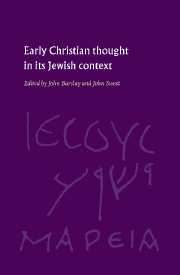Book contents
- Frontmatter
- Contents
- List of contributors
- Preface
- List of works by Morna D. Hooker
- List of abbreviations
- Chapter 1 Introductory Essay
- I THE SOCIAL CONTEXT OF EARLY CHRISTIANITY
- II SOME EARLY CHRISTIAN SOURCES
- Chapter 4 Jesus
- Chapter 5 Matthew
- Chapter 6 Mark
- Chapter 7 Luke–Acts
- Chapter 8 John
- Chapter 9 Paul
- Chapter 10 Deutero-Pauline letters
- Chapter 11 Hebrews
- Chapter 12 Revelation
- Chapter 13 Other early Christian writings: ‘Didache’, Ignatius, ‘Barnabas’, Justin Martyr
- III SOME EARLY CHRISTIAN THEMES
- Index of names
- Index of subjects
- Index of texts
Chapter 9 - Paul
from II - SOME EARLY CHRISTIAN SOURCES
Published online by Cambridge University Press: 22 September 2009
- Frontmatter
- Contents
- List of contributors
- Preface
- List of works by Morna D. Hooker
- List of abbreviations
- Chapter 1 Introductory Essay
- I THE SOCIAL CONTEXT OF EARLY CHRISTIANITY
- II SOME EARLY CHRISTIAN SOURCES
- Chapter 4 Jesus
- Chapter 5 Matthew
- Chapter 6 Mark
- Chapter 7 Luke–Acts
- Chapter 8 John
- Chapter 9 Paul
- Chapter 10 Deutero-Pauline letters
- Chapter 11 Hebrews
- Chapter 12 Revelation
- Chapter 13 Other early Christian writings: ‘Didache’, Ignatius, ‘Barnabas’, Justin Martyr
- III SOME EARLY CHRISTIAN THEMES
- Index of names
- Index of subjects
- Index of texts
Summary
INTRODUCTION
Of the thirteen letters in the New Testament that bear Paul's name, seven are generally considered ‘undisputed’, although a few scholars accept fewer than seven, and a good number accept more than seven. Nevertheless, there is sufficient agreement that scholars of all persuasions base most of their analyses of Paul on the following letters: Romans, 1 Corinthians, 2 Corinthians, Galatians, Philippians, 1 Thessalonians, and Philemon. The last of these, Philemon, a personal letter of about one page, is extremely revealing for understanding Paul the diplomat and missionary, and it also sheds light on the social status of some of the people who made up his churches. But it contains no theology, and so drops out of discussions of Paul's thought.
In this chapter, I shall deal with only four of the most substantial topics in Pauline studies: his mission, his Christology, his views of the Jewish law, and his various statements about the election of Israel and the salvation of the world. Understanding these four subjects provides a basis for further exploration of his life and thought, and they are also the four issues of greatest importance for understanding his relationship to the rest of Judaism.
- Type
- Chapter
- Information
- Early Christian Thought in its Jewish Context , pp. 112 - 129Publisher: Cambridge University PressPrint publication year: 1996
- 3
- Cited by

